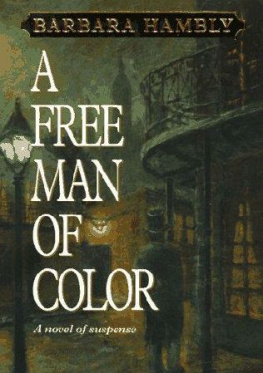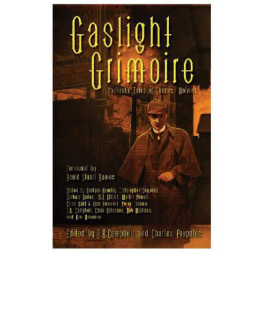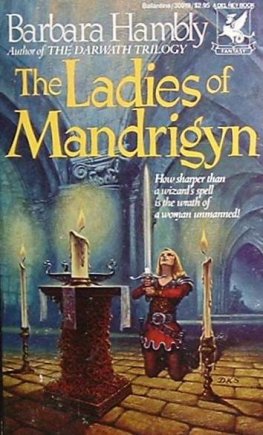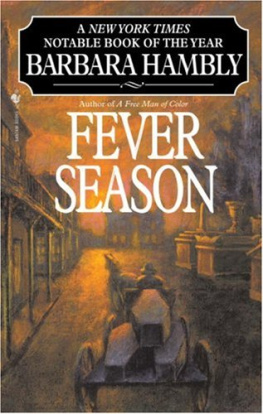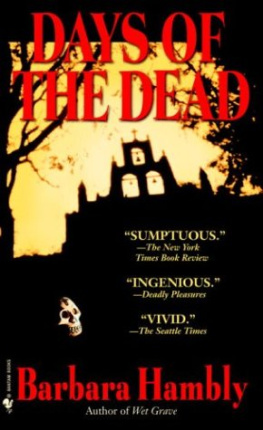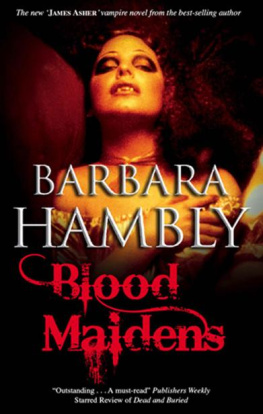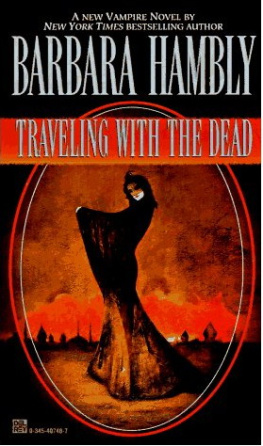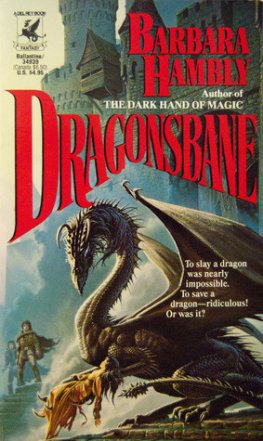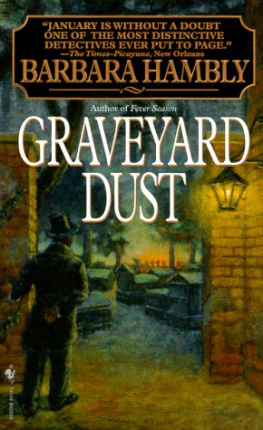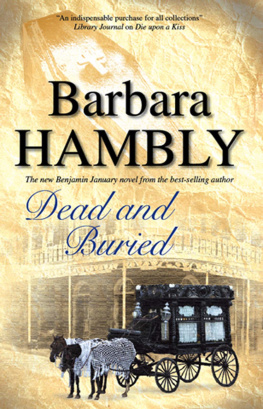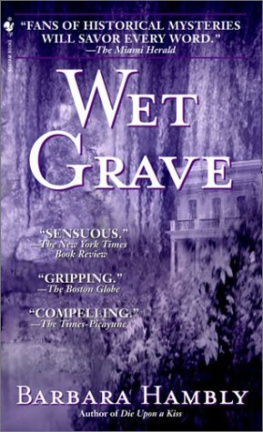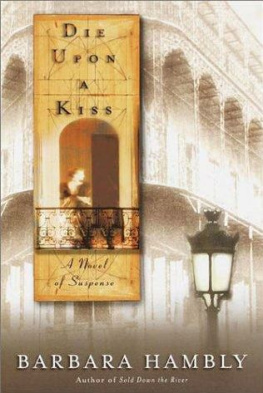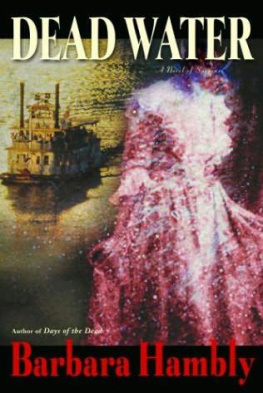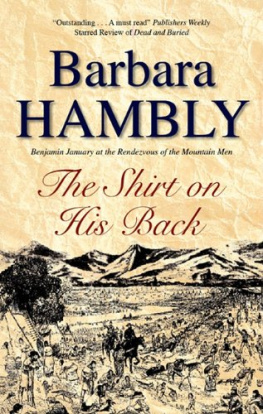Barbara Hambly - A Free Man of Color (Benjamin January, Book 1)
Here you can read online Barbara Hambly - A Free Man of Color (Benjamin January, Book 1) full text of the book (entire story) in english for free. Download pdf and epub, get meaning, cover and reviews about this ebook. year: 1998, publisher: Random House Publishing Group, genre: Art. Description of the work, (preface) as well as reviews are available. Best literature library LitArk.com created for fans of good reading and offers a wide selection of genres:
Romance novel
Science fiction
Adventure
Detective
Science
History
Home and family
Prose
Art
Politics
Computer
Non-fiction
Religion
Business
Children
Humor
Choose a favorite category and find really read worthwhile books. Enjoy immersion in the world of imagination, feel the emotions of the characters or learn something new for yourself, make an fascinating discovery.
- Book:A Free Man of Color (Benjamin January, Book 1)
- Author:
- Publisher:Random House Publishing Group
- Genre:
- Year:1998
- Rating:5 / 5
- Favourites:Add to favourites
- Your mark:
- 100
- 1
- 2
- 3
- 4
- 5
A Free Man of Color (Benjamin January, Book 1): summary, description and annotation
We offer to read an annotation, description, summary or preface (depends on what the author of the book "A Free Man of Color (Benjamin January, Book 1)" wrote himself). If you haven't found the necessary information about the book — write in the comments, we will try to find it.
A Free Man of Color (Benjamin January, Book 1) — read online for free the complete book (whole text) full work
Below is the text of the book, divided by pages. System saving the place of the last page read, allows you to conveniently read the book "A Free Man of Color (Benjamin January, Book 1)" online for free, without having to search again every time where you left off. Put a bookmark, and you can go to the page where you finished reading at any time.
Font size:
Interval:
Bookmark:
All my thanks and humble gratitude go to Octavia Butler for her time and consideration in reading the original of this manuscript and for her invaluable comments; to George Alec Effinger for his support and advice about local New Orleans customs; and to Leslie Johnston and the rest of the research staff at the Historic New Orleans Collection for all their help.
Fever Season
Graveyard Dust
Sold Down the River
Die Upon a Kiss
Wet Grave
Days of the Dead
Dead Water
All available from Bantam Books

BARBARA HAMBLY attended the University of California and spent a year at the University of Bordeaux, France, obtaining a masters degree in medieval history. She has worked as both a teacher and a technical editor, but her first love has always been history. Ms. Hambly lives in Los Angeles.

In any work of fiction dealing with the American South, a writer runs into the problem of language and attitudesspecifically not only words and phrases but outlook, upbringing, and unspoken assumptions, which, though widely held and considered normal at the time, are appalling today.
The early 1830s were a time of great change in America. President Andrew Jacksons view of democracy was very different from the eighteenth-century vision of the countrys founders. Civil War and Reconstruction lay a generation in the future, and the perception of blacksby the whites and by the blacks themselveswas changing, too.
In New Orleans for most of the nineteenth century, it would have been as offensive to call a coloredthat is, mixed-raceman or woman black, as it would be today to call a black person colored. Both words had connotations then that they do not have now; both words are freighted now with history, implications, and inferences unimaginable then.
I have tried to portray attitudes held by the free people of color toward the blacksthose of full or almost-full African descent, either slave or freeand toward the Creolesat that time the word meant fully white descendants of French and Spanish colonistsas I have encountered them in my research. Even a generation ago in New Orleans, the mothers of mixed-race teenagers would caution their children not to date anybody darker than a paper bag. Light skin was valued and dark skin discredited, and a tremendous amount of energy went into making distinctions that seem absurdly petty today. An intricate hierarchy of terminology existed to categorize those of mixed race: mulatto for one white, one black parent; griffe or sambo for the child of a mulatto and full black; quadroon for the child of a mulatto and a full white; octoroon for a quadroons child by a full white; musterfino or mameloque for an octoroons child by a full white. (Ive seen alternate meanings for griffe, sambo, and musterfino, so theres evidently some question about either what the records were talking about, or whether the people at that time used the same words for the same things.)
White Creoles, by the way, had an intricate hierarchy of words to categorize each other as to social standing and how long their families had been prominent in New Orleans society, so they evidently just liked to label things. Americans, of course, simply did not count.
I have not attempted to draw parallels to any modern situation or events. I have tried to construct a story from a historical setting, using the attitudes and outlooksand, of necessity, terminologyof that time and place. I have attempted, to the best of my ability, neither to glamorize nor to conceal. The territory is touchy for those who have suffered, or whose families have suffered, from the prejudices and discrimination that once wasand still is to some extentcommonplace. To them I apologize if I have inadvertently offended. My goal is, as always, simply to entertain.
If you enjoyed Barbara Hamblys
A FREE MAN OF COLOR
you wont want to miss any
of the superb mysteries in the
Benjamin January series.
Look for
FEVER SEASON
GRAVEYARD DUST
SOLD DOWN THE RIVER
DIE UPON A KISS
WET GRAVE
DAYS OF THE DEAD
at your favorite booksellers.
And dont miss
DEAD WATER
the latest Benjamin January novel, available
wherever Bantam Books are sold.

Had Cardinal Richelieu not assaulted the Mohican Princess, thrusting her up against the brick wall of the carriageway and forcing her mouth with his kisses, Benjamin January probably wouldnt have noticed anything amiss later on.
Now, THEREs a story for the papers. January considered the tangle of satin and buckskin, the crimson of the prelates robe nearly black in the darkness of the passageway save where the oil lamp that burned above the gate splashed it with gory color, the grip of the mans hand on the womans buttocks and the way her dark braids surged over his tight-clenched arm. Certainly the American papers: Cardinal Richelieu Surprised with Leatherstockings Sister. It was a common enough sight in the season of Mardi Gras, when the February dark fell early and the muddy streets of the old French town had been rioting since five oclock with revelerswhite, black, and colored, slave and free, French and Americanbedizened in every variation of evening costume or fancy dress. God knew there were women enough yanking men off the high brick banquettes into doorways and carriage gates and public houses on Rue Royale and Rue Bourbon and all over the old quarter tonight. He wondered what Titian or Rembrandt would have made of the composition; he was turning politely to go when the woman screamed.
The fear in her voice made him swing around, just within the arch of the gate. The oil lamps light must have fallen on his face, for when she screamed a second time, she cried his name.
Monsieur Janvier!
A stride took him to the grappling forms. He seized His Eminence by the shoulder and tossed him clear out of the carriageway, across the brick banquette, over the dark-glittering stream of the open gutter and into the oozy slops of Rue Ste.-Ann with a single throwfor January was a very big manmaking sure to cry as he did so in his most jovial tones, Why, Rufus, you old scamp, aint nobody told you ?
Timing was everything. Hed learned that as a child.
Even as his victim went staggering into the jostle of carriages, he was bounding after him, catching the mans arm in a firm grip and gasping, Oh, my God, sir, Im terribly sorry! He managed to yank the enraged churchman out of the way before both could be run down by a stanhope full of extremely Cooperesque Indians. I thought you were a friend of mine! My fault entirely! Richelieu was pomegranate with rage and thrashing like a fish on a hook, but he was also a good half foot shorter than Januarys six-foot three-inch height and hadnt spent nine years carrying cadaversand occasionally pianoforteson a daily basis. I do beg your pardon!
January knew the man would hit him the moment he let go and knew also that hed better not hit back.
He was correct. It wasnt much of a blow, and at least Richelieu wasnt carrying a cane, but as the scarlet-masked villain flounced back across the gutter and disappeared into the dark maw of the gate once more, January was surprised by his own anger. Rage rose through him like a fever heat as he tasted his own blood on his lip, burning worse than the sting of the blow, and for a time he could only stand in the gluey street, jostled on both sides by gaudy passersby, not trusting himself to follow.
Font size:
Interval:
Bookmark:
Similar books «A Free Man of Color (Benjamin January, Book 1)»
Look at similar books to A Free Man of Color (Benjamin January, Book 1). We have selected literature similar in name and meaning in the hope of providing readers with more options to find new, interesting, not yet read works.
Discussion, reviews of the book A Free Man of Color (Benjamin January, Book 1) and just readers' own opinions. Leave your comments, write what you think about the work, its meaning or the main characters. Specify what exactly you liked and what you didn't like, and why you think so.

